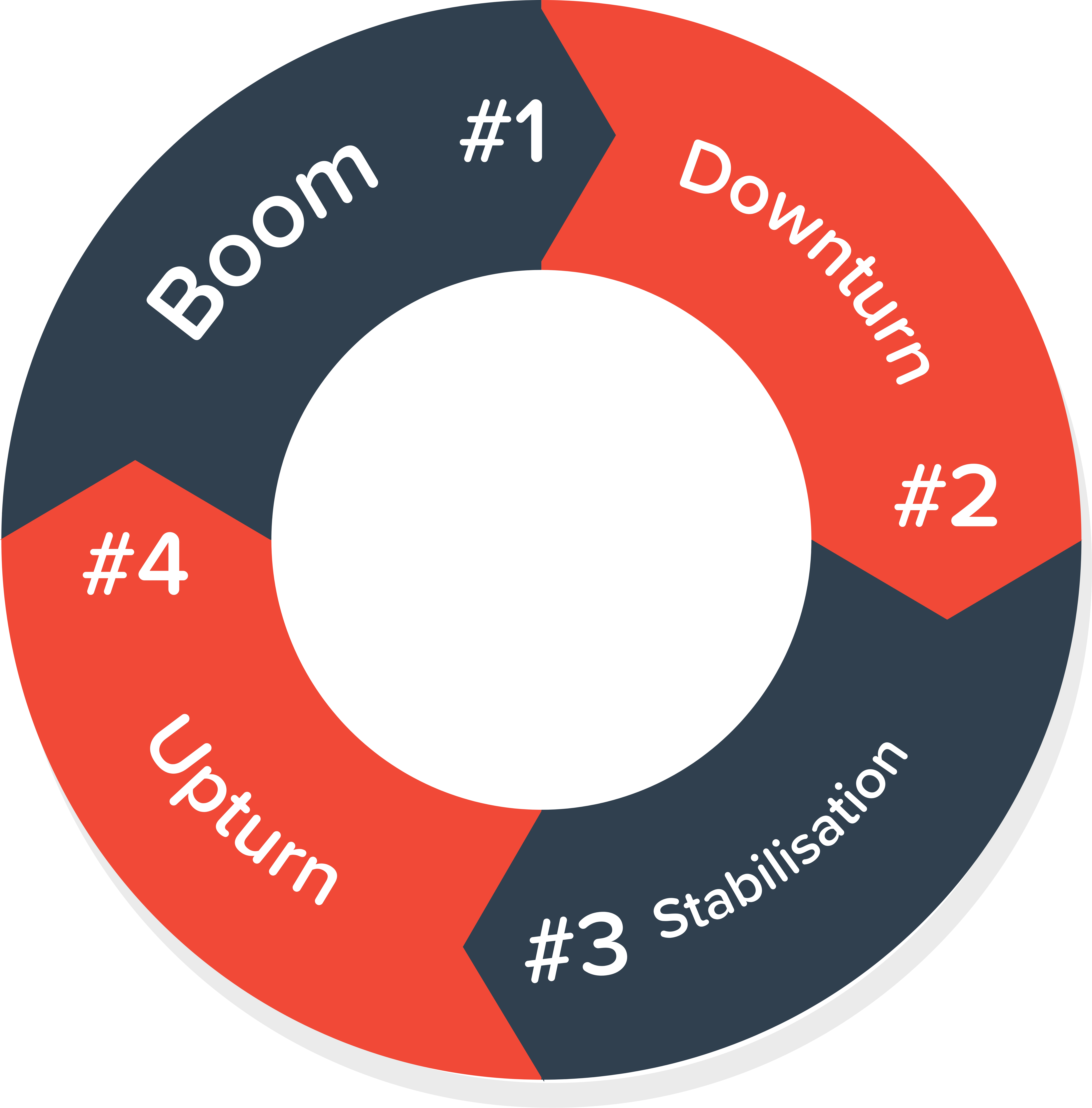The Australian Property Cycle: When to Buy, Hold and Sell Property

For property investors, understanding the property cycle has long been considered essential, acting as a guideline in helping identify the best times when to buy, hold, and sell, in anticipation of what comes next.
Shaped by several economic and social factors, the property cycle typically moves through four stages: Boom, Downturn, Stabilisation, and Upturn.
How Long Does The Property Cycle Last?
Historically, a property cycle lasts 7-8 years; however, the phases aren’t strictly tied to time; instead, they are generally shaped by variable factors, such as population growth, interest rates, government policy, and consumer confidence.
In Australia, traditionally it’s believed that a property cycle takes approximately 10 years for house prices to double, which aligns with a 7-8 year cycle. However, recent property trends indicate slower property growth over the past decade. As a result, some experts now predict that the property cycle in Australia is more likely to span 15-18 years.
The Four Stages of the Property Cycle:

Stage 1: The Property ‘Boom’.
Supply: Mid-High
Demand: High
This is the stage that investors eagerly anticipate. Property prices grow rapidly, demand peaks, and clearance rates soar. If you’re looking to sell, this is a popular time to do it.
Usually lasting just 1-2 years, this phase prompts investors to closely monitor the closing stages of the previous cycle, to act swiftly and capitalise on the boom effect before it ends.
Stage 2: The ‘Downturn’.
Supply: High
Demand: Mid-Low
Following a property boom, demand eventually drops, while the supply stays high due to activity from developers. This leads to the downturn phase, marked by signs such as increased vacancy rates and declining rental prices. It’s not uncommon to see a decline in property prices, and developers may face redundancies and financial vulnerabilities.
This phase often lasts 3-4 years and can stretch longer following a prolonged ‘boom’.
Stage 3: The ‘Stabilisation’ Period.
Supply: Mid
Demand: Mid
During the stabilisation stage, the market adjusts to an excess of property supply and reduced demand. Interest rates tend to decrease, and property values begin a gradual recovery.
This period can be an opportune time for investors, as lower prices and reduced market competition make it an appealing time to buy.
Stage 4: The ‘Upturn’.
Supply: Mid
Demand: High
As buyers return to the market, competition increases, driving down vacancy rates and pushing up rental and property prices. Developers start significant projects, aiming to complete them as the boom phase hits.
The upturn typically lasts 3-4 years as property prices grow, setting the stage for the next ‘boom’.
Current Stage of The Australian Property Cycle
Some experts consider the end of 2023 and start of 2024 the start of a new property cycle, meaning we’re currently in the heart of the ‘boom’. However, it’s important to note that property cycles may vary across different submarkets, and some locations may experience the property cycle differently to others.
While national property prices remain strong after 18 months of growth, property prices in Melbourne, Hobart and Darwin saw slight declines in July.
A property cycle usually sees higher highs than lower lows, reinforcing the trend of property values increasing.
When to Buy and When to Sell Property?
Many investors aim to time their purchases and sales according to the property cycle. A fundamental principle of the cycle is: Buy when demand is low and supply is high. Sell when demand is high and supply is low.
This principle is closely tied to market psychology. During the ‘boom’ phase, people become motivated to sell, which pushes the market into ‘downturn’. During the ‘stabilisation’ period, buyers begin to enter the market, fuelling a ‘boom’.
Warren Buffet said, “Be fearful when others are greedy, and be greedy when others are fearful”.
To stay ahead of the curve, it’s often better to be proactive with the cycle rather than reactive, beating others to the punch.
When to Hold in The Property Market?
Deciding when to hold onto a property is just as crucial as knowing when to buy or sell. One of the significant advantages of holding property is the potential for compounding wealth. As property values increase over time, the equity you build can be reinvested in additional properties or other assets, creating a snowball effect of growth. The rental income generated from your property can also be reinvested, further compounding your wealth. By holding onto property through market cycles, you can allow your investment to grow and appreciate, leading to substantial long-term financial gains.
Knowing when to hold can significantly impact your investment outcomes and the strategic timing of holding depends on understanding the property cycle and aligning your long-term financial goals.
Holding Property During The ‘Downturn’.
Holding during a market downturn can be a strategic move if you have confidence in the property’s long-term potential. Even if prices are falling and rental yields are lower, retaining ownership allows you to benefit from future market recoveries.
If you believe in the property’s future appreciation or have a long-term strategy, holding through this phase can be advantageous.
Holding Property in The ‘Stabilisation’ Period.
During the stabilisation period, property values and rental incomes may gradually improve, and this can be an optimal time to hold. Holding during ‘stabilisation’ can position you well for future growth, allowing you to benefit from a market that is setting the stage for the next ‘upturn’.
It’s a time you may want to consolidate your assets and prepare for potential gains.
Preparing for an ‘Upturn’.
As the market transitions from ‘stabilisation’ to ‘upturn’, holding onto your property can be beneficial. With increasing demand and tightening supply, property values often rise. By maintaining your investment during this phase, you may be able to capitalise on the growth and potentially achieve higher returns as the market peaks.
Holding Property as an Investment Strategy.
Regardless of the current market conditions, holding a property can be a sound long-term strategy. Property generally appreciates over time, so holding allows you to weather short-term fluctuations while benefiting from overall growth. This approach is particularly effective if your investment strategy focuses on long-term capital appreciation and consistent rental income.
Knowing when to hold involves understanding your position within the property cycle, aligning with market conditions, and adhering to a long-term investment strategy.
What’s next?
Once you have a firm understanding of the property cycle, this will help you identify the property cycle stages and enable you to plan accordingly, making the most out of your investment. By making informed decisions about when to buy, hold, and sell, you can maximise your property’s value, benefit from compounding wealth, and take advantage of future market opportunities.
If you’re looking to finance your next investment property, be sure to consult with your local MoneyQuest mortgage broker today! We’re ready to help you obtain finance approval so that you can set, execute and maximise your property investment strategy before it’s too late!
Disclaimer:
This article is written to provide a summary and general overview of the subject matter covered for your information only. Every effort has been made to ensure the information in the article is current, accurate and reliable. This article has been prepared without taking into account your objectives, personal circumstances, financial situation or needs. You should consider whether it is appropriate for your circumstances. You should seek your own independent legal, financial and taxation advice before acting or relying on any of the content contained in the articles and review any relevant Product Disclosure Statement (PDS), Terms and Conditions (T&C) or Financial Services Guide (FSG).
Please consult your financial advisor, solicitor or accountant before acting on information contained in this publication.
Proudly Part Of

The Money Quest Group (MQG) is one of Australia's leading boutique mortgage broking businesses, with a network of more than 600 brokers nationwide. Known for their exuberant culture and superior support, MQG provides brokers access to a range of financial products from more than 60 lending institutions and suppliers, and exclusive access to in-house benefits and services.
© 2017-2024 MoneyQuest Australia Pty Ltd, Australian Credit Licence 487823